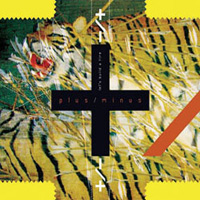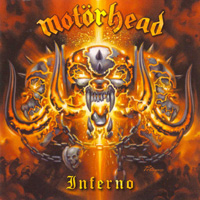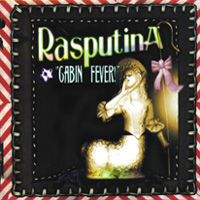 Rasputina
Rasputina
“Cabin Fever!” (Instinct)
An interview with cellist/singer Melora Creager
by Jamie Kiffel
A weaver of injured dolls, their button eyes loose at the threads; still-bleeding corpses set to waltz with blood-pouting vampires; rusting Victorian corset stays quilted with tight-eyed babies: This is the lyrical world of Rasputina‘s Melora Creager, a water-stained Ophelia warbling death songs from a world of delicately rotting dresses.
I anticipated my conversation with Melora – lead singer and composer of the three-part cello band and a native Kansan – to be a poisonous alchemy of witchcraft, leeches, and abominations untold. Sometimes called a Goth (she’s noted in interviews that “it’s funny”), a classical cellist who composes her three-part arrangements on staff paper, and the possessor of an intense, whispery vibrato that more closely resembles a bow pulled across strings than a woman’s voice, the corset-wearing singer with the wraith’s eyes seemed to be nothing if not unsettling.
Yet I discovered that Melora, who assembled the band through classified ads in 1992 and has since – with new members K. Cowperthwaite and Nana Bornant – voraciously ripped out yet another album filled with behemoths, attic creatures, and underwater horrors, may actually have a bright, soft, even shy side to her mangled and shredded musical persona.
For instance: She’s a mom.
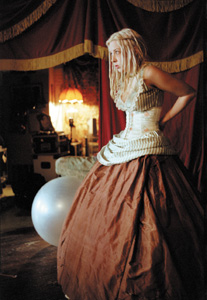 Do you have a daughter or a son?
Do you have a daughter or a son?
I have a daughter, Hollis. She’s 2 and a 1/2.
Were you ever married?
I was married a few years ago, for a short time.
So where does Hollis go when you’re touring?
She’s with her dad and her aunt. She goes to nursery school too, stuff like that.
So what does she feel about your career?
She loves music, listens to the cello anytime we’re rehearsing, always is surrounded by the people from the band.
Interesting? Maybe. And yet this all sounded far too banal for the Queen of Cobwebs. Where were her bloody skeletons, her tetanus-laced coffin nails, her drowned rats? I attempted a leading question.
Does being a mother interfere or confuse you with your lyrics? They’re so dark or death-related…
There were definitely changes in how I felt about some things when my daughter was born. I weigh everything more. I make more of a decision about it, if it’s something I want to represent or not. I don’t think that this new CD is as dark because I don’t think I really feel as dark.
Is there anything you don’t sing anymore because of Hollis?
Something like “Crybabies” (from Thanks for the Ether), but, you know, I don’t regret writing the song or anything like that.
And yet you’ve got the weird baby statue onstage (the band appears onstage surrounded by rose petals, a statue of a boor, a monkey wearing a fez, and a nightmarish, apparently dead baby in a high chair).
That’s definitely of questionable taste.
That’s just showmanship, huh?
Yeah, the kids who made those babies in the monster movies, they didn’t turn into a different person after having a child.
What kids? What monster movies? I didn’t ask.
You must be asked a lot about your lyrics.
Surprisingly, no.
My heart jumped: finally, here was my chance to find out what the stuff of Melora Creager’s musical mind is really all about! I tried to keep my cool, but I was all a-twitter. This was, after all, a lyric junkie’s dream come true, the equivalent of being let inside The Vault. Free reign of Area 51. I was in. I took a deep breath…
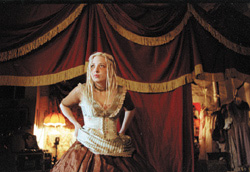 A lot of people like to try to leave things open to interpretation, so I won’t try to pigeonhole you on anything. But… let’s see, one thing I’m really curious about is in “Signs of the Zodiac” (on How We Quit the Forest), what’s the relationship, the “Oh honey, I know it hurts?” line? Is it a mother and a child?
A lot of people like to try to leave things open to interpretation, so I won’t try to pigeonhole you on anything. But… let’s see, one thing I’m really curious about is in “Signs of the Zodiac” (on How We Quit the Forest), what’s the relationship, the “Oh honey, I know it hurts?” line? Is it a mother and a child?
Oh, it’s not concrete to me in any way. The meaning’s different to me, line to line. It can be something I thought of from my life, or words I just strung together.
This cannot be, I thought over and over. There must be something more.
It sounds like you play with words a lot, like “Dwarf Star,” for instance.
Yeah, a lot of stuff is just the sound of the words, to me. And I don’t have much deep meaning in what I do… it’s like subconscious combinations.
Okay. Um… and “The New Zero” (on How We Quit the Forest), that was one that struck me. Do you know the Bob Lind song, “Mr. Zero”?
No.
It’s about a guy called Mr. Zero, and it’s similarly put together in that you don’t know who he is or what he is. It gives that same kind of outcast feeling. Although from yours, I got the Yeti feeling.
Yeah, yeah! (Suddenly animated) That’s what I had. It’s like the Abominable Snowman song to me.
When you say “the ice hotel in the magazine…” ironically, I did an article for Woman’s World about an ice hotel, and I wondered if you’d seen a real one or if you’d just come up with that.
Uh, I saw it in a magazine. And I like to think that I saw it pretty early on because after I wrote the song, it was a really hot press thing, it was everywhere and everyone saw it.
It seems you go for things that are a little bit different, offbeat…
I guess you could say that. (chuckling)
Were you always that way?
I was a very geeky kid, a very focused, geeky kid. Yeah, I was like that. Oddball.
I was grasping for a hidden release latch, the button that would send all the scary stuff of Rasputina tumbling forth…
Anything stand out that made you different, or things you liked, things that made people say, “What on Earth?”
I was a loner, not being outside and running around or going swimming and stuff, but being in a fantasy world.
I knew what to ask.
Where would you have been if you could’ve been anywhere?
(Pause) Uh… (silence)
Had I been I unclear?
In terms of those fantasies.
When I was a kid?
Yeah.
Uh… (pause) Uh…
I’m losing her…
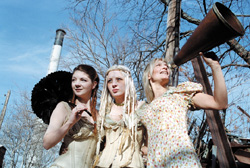 I mean, what kinds of places in your mind, or what kinds of things were you thinking about?
I mean, what kinds of places in your mind, or what kinds of things were you thinking about?
(Laughing like an exasperated child) I don’t know! I can’t remember.
(Laughing too, but internally wringing my hands) Okay. Um, what about now? Any unusual collections?
Collections of objects or something? Uh… Well, I… got all the taxidermy out of the house because of my daughter…
What were your favorite pieces?
A bear, and a deer. I had a friend who had the animals from The Knitting Factory. Our collections would merge.
Envision merging taxidermy… Now we’re getting somewhere.
Nothing else that’s unusual that you collect? You seem like the kind of person who would have… things.
I definitely have stuff – I have cases full of beads and ribbon…
You used to design jewelry?
I used to, a few years ago, for a long time, yeah. And I’ve just got a lot of beautiful beads, and you never know when you’re going to need that stuff.
Any occult interests? Anything in particular, any tarot, witchcraft, paganism?
None of that stuff, really… the I Ching captured my imagination about a year ago.
Any interesting results?
Just lets you think clearly. There’s some good poetry in there, from the ancient Chinese.
Did anything come through (the oracle) that stays with you? Any memorable things that gave you ideas or helped you come to an important decision?
Well, I was recording and it helped me make some decisions with that stuff, and I always got such positive feedback about this particular recording that it really helped give me faith.
How did you get into (the oracle)?
My mom was into it in the ’60s when she was a hippie, and she showed me all her books and stuff.
What does she do now?
She’s a social worker, and she’s a weaver and into all different stuff.
And dad?
Um, my dad… is… very old and lives in Kansas.
So you’re closer with your mom.
Yeah.
Are you an only child?
I’ve got an older brother and a younger sister.
Are they very different from you?
Yeah. Actually, all three of us are adopted, so we’re all very different. But it’s interesting how we’re the same, too.
How has your Mom taken to this unusual artistic way of expressing yourself? You know, it’s kind of a cobwebby way to go.
Uh… um… uh… well, I don’t really feel that way about it.
What?! I kept my cool, somehow.
How do you feel about it? The way I always saw it was as a beautiful decay. But do you not see it that way?
It’s more about music to me… I just get immersed… and the packaging and the trappings… just as with the lyrics, they don’t have a lot of deep meaning to me. I’ve just given all I can not to be boring because we’re just sitting there when we play. It’s my taste, and I don’t find it that dark.
What would be dark for you? What would be too grotesque? Because certainly, you sit there and talk about digging at scars, and things not everybody talks about.
What would gross me out? (Thinking) I’m certain that I’m gross-out-able. I’m wracking my brain. You know, I get scared by movies. Some scary movies. Hideous, bloody scenes would certainly affect me terribly.
But nothing that you could write?
Uh… something that would seriously freak me out? Uh…
I think about a song like “Endomorph” (on Thanks for the Ether) where you’ve got bloody fingerprints, and you’ve got ideas of killing…
It doesn’t mean that to me. I just think words like endomorph and ectomorph are such weird words, and the “bloody,” I just throw that in there. To me, they’re like many isolated ideas strung together. So I don’t get the overall view that somebody else might because they’re all true things that mean something to me.
In other words, I’m learning something more about myself in this interview than I knew before?
(Laughing) It’s all psychology, baby!
Oh man, I’m giving more away in this interview than I thought I would!
(Laughter)
Alright, here’s a line that always stays with me – or am I hearing it wrong? – it’s in “State Fair,” about the taco seller…
Taco seller? No. There is no taco seller.
(Mortified) Oh, I thought he was running a taco stand.
“I used to go out with this other man, he ran the Sno-cone stand. He looked good from behind.”
That’s what I thought you said!
(Giggling)
Where’d that come from?
It’s really like automatic writing. I don’t know where… Well, the whole song is my memories of carnivals and Kansas in the ’70s. You know, I’m just trying to think about that and trying to express a memory in a song, but it’s goofy, too. It’s about having gone out with everybody that works at the fair.
Have you done that?
I didn’t do that, no. I haven’t dated any carnies. (Laughing)
I think carnies are some of the scariest people in the world.
Yeah!
 Does your drummer, Jonathon TeBeest, get freaked out by you?
Does your drummer, Jonathon TeBeest, get freaked out by you?
He hasn’t played anything like this before, but what would that be? There’s a lot of fighting about that baby. Everyone hates it but me! Hollis can’t see it for nothin’, so it’s gotta be hidden away, and there’s nowhere she doesn’t go, so it’s like a band project to keep that baby hidden. You never know where it’s gonna be.
What do the other women say to you about it?
Just that it’s very disturbing, and it’s not liked in any way.
Where’d you get it?
Some fans from Alberquerque sent it. These kids that I know from the Internet.
You instantly liked it and they instantly hated it.
I’m proud not to deny that I like it because that would be fake of me.
The band members have recently changed. How has that been for you, and how did that happen?
Where did Agniezska Rybska, Lisa Haney and Julia Kent go? I’d had theories that she’d eaten them.
Nana [pronounced NAH-nah] has been touring with us since the last record. Kris has probably played with me for a year and a half or so. It was a big deal when Julia quit. I became pregnant and we were finished with Sony all at the same time, so it was time to step back and think. I didn’t do much music work when I was taking care of my baby, when she was little.
That a major change for you, into Baby World?
Yeah, but it was good that it happened when it did, because I could focus on my child properly, and if I hadn’t had a child, all of that stuff would have been upsetting: For Julia to quit… Sony. But as it was, it’s all been really positive.
Why did Julia leave?
She’d talked about it for a long time. We had a co-dependent relationship, really intense. We grew unhappy; she left.
How did you meet?
I found her through an ad.
But you became close.
Yeah, we played together ten years.
And you found the other women through ads?
Yeah, lately, I’ve done it more on the Internet. That’s how I found Jonathon.
Did they have to share your vision to be able to play, or are they just playing as musicians?
It really helps everybody when somebody is into it and doesn’t take it as me bossing them around. Like Kris is totally into costumes and putting together outrageous, cool clothes, and she’s musically putting a lot into it. But it doesn’t always happen that way.
And you’re an Aries, so you have to be the center of attention.
I’m actually very shy. (laughing)
It’s interesting that you have this running theme, whether you realize it or not, of female constraint. And at the same time, it’s very much paired with power.
Well, when we have those outfits on, we feel like supergirls. When we’re moving equipment and cellos in them, it’s really hard, and we don’t feel restricted at all.
And the time period that fascinates you – the 1800s – that’s a time when women were sort of beaten down and were constrained…
It’s like turning it all around, playing the cello in a different way, presenting these little girls or weak women as the opposite. It’s my little way of trying to push buttons.
Does anybody ever give you a hard time about it?
Sometimes in an article, it might imply that we can “barely keep our breasts in our shirts!” That’s a sweaty kind of aspect that just isn’t there, really.
You used to do performance art, right?
Probably not technically, but when I’d just finished art school (at Parsons), I hung around with a lot of drag queens. They got me to be in crazy shows and do crazy stuff. I call that performance art.
That’s unusual for a shy person.
I think a lot of performers have this intense shyness, too. I’m not as bad as I used to be, but I’m nervous in small situations.
So onstage, you’re a different character.
You can’t really see the people too much when you’re onstage, but if you’re playing for a tiny audience, where you can see everybody, it can be really nerve wracking.
Even now?
Yeah, Kris and I played a party last summer, just she and I, and it was really small and I could see everybody and that made me much more nervous.
You speak quickly onstage, but that seems like it’s part of your patter.
Um… it’s being, like, embarrassed. (laughing) Yeah, in my heart of hearts, I’m in a panic the whole time I’m onstage.
How long ago did you know that you wanted to be in a band professionally?
I was in a band called Ultra-Vivid Scene in the late ’80s, and that was an exciting time in music, with all sorts of influential bands – The Pixies, Throwing Muses. That was my first exposure to how people were living or what it was like, and I just thought: That is all right. I’m gonna do that, too.
Was that during art school?
It was right after school. I studied photography.
Is that where things like “E. Leon Rauis” (on Thanks for the Ether) came from?
Photography is a big influence on me, and architecture too. A lot of musicians come from being fans of popular music of some kind, but I don’t come from that so much as being an intense fan of art. Rasputina is a continuation of the photography I was trying to do in school. In art school, I’d be accused in the fine arts department of being commercial. My drawings looked like illustrations. I’m sure that applies to me now somehow, though I’m not sure how.
A lot of people get accused of that, I’m not sure it matters.
Well, I got accused of using visual tricks like an illustrator would, like that’s not art or something.
Well, you use musical tricks now, and I think they’re really inventive. I love how in “State Fair,” you have that carnival noise that you make with the cello.
That can be really hokey, like (hums The Snake Charmer Song aka “There’s a place in France…”) but those are classic themes too.
Well, those are sort of parlor tricks.
But I certainly tried not to overuse them, ha.
Do you find you have a different way of hearing things than other people? Because you seem to pick up sound and rhythm in a way that I don’t usually hear.
Well, for me, a lot of stuff is kind of an academic exercise. Like experimenting in an uptight way.
Uptight how?
I like to give myself assignments and be kind of rigid about things. Like you have to write a rock song in three minutes, express an idea, and you have to be concise.
And then her cell phone dropped out. Or my tape cut off. I’m not sure which. Mortified, I recorded myself talking/cursing for the next few moments. Over the next couple of days, however, I did figure out that “Leechwife,” (on How We Quit The Forest, is exactly three minutes long and a rock anthem.
The following afternoon, I had the opportunity to exchange a few more words with Melora, via email.
You often tell stories that sound historical but are so unusual I can’t tell if they are true or fanciful inventions. Is “Rats” (on Cabin Fever!) based on fact, or did you make up the tale?
“Rats” is true, although it was not in Bolivia, and the people didn’t really mind eating those rats. They are still a delicacy there today.
I also noticed that the swiping knife sound on that track reminds me of the backwards snare drum in “Strawberry Fields Forever.” What created that sound, and what inspired it?
I made a lot of the drum programming out of sound effects. The rats track has a garden rake scraping asphalt, pile drivers, light pulls, doors closing, and many other things.
I also find that when I write and really get into a groove where the work is flowing, I can “channel” a character or a scene and it seems to write itself, almost as if someone else is generating the ideas for me. Do you ever experience this and if so, what songs might be good examples of it?
All creativity seems divine to me. You’ll hear great singers talk about that, too. Like they’re not doing it. Maybe the subconscious is the energy of everybody, living or dead.
Along the lines of unusual inspirations, what inspired the duck call sound in “Leechwife”?
The duck was taken from some cartoon. “Leechwife” is cartoony to me.
The power-rock sound of “Leechwife” makes me think of Lestat’s rock band in Queen of the Damned (the book rather than the movie). Did you have anything like that in mind?
I like incongruity. A feminist take on a medieval profession with an arena rock presentation.
If there’s one town that I can identify with your sound (polished, classical/traditional instrumentation-meets-modern culture/coffin images/objects so mixed they could be on a voodoo altar), it’d be New Orleans. Have you spent any time there?
I loved New Orleans, but I think Rasputina is less urban than that. There’s an early American aspect to my inspiration that could be represented by… Ithaca, New York.
(www.instinctrecords.com)

